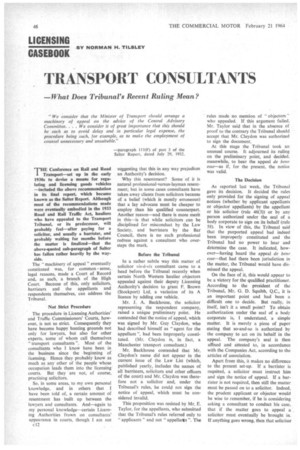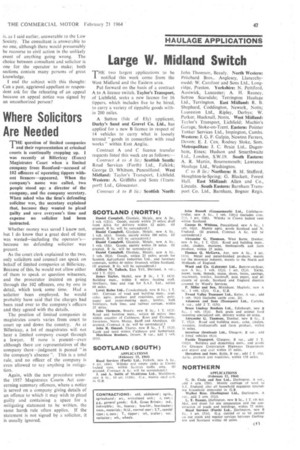TRANSPORT CONSULTANTS
Page 48

Page 49

If you've noticed an error in this article please click here to report it so we can fix it.
—What Does Tribunal's Recent Ruling Mean?
LICENSING CASEBOOK
BY NORMAN H. TILSLEY
THE Conference on Rail and Road 1 Transport—set up in the early 1930s to devise a means for regulating and licensing goods vehicles —included the above recommendation in its final report, which became known as the Salter Report. Although most of the recommendations made were eventually embodied in the 1933 Road and Rail Traffic Act, hauliers who have appealed to the Transport Tribunal, or its predecessor, will probably feel—after paying for a solicitor, and usually a barrister, and probably waiting for months before the matter is finalized—that the above-quoted sub-paragraph of Salter has fallen rather heavily by the wayside.
The machinery of appeal" eventually constituted was, for common sense, legal reasons, made a Court of Record and, as such, a branch of the High Court. Because of this, only solicitors, barristers and the appellants and respondents themselves, can address the Tribunal.
Not Strict Procedure The procedure in Licensing Authorities' and Traffic Commissioners' Courts, however, is not so strict. Consequently they have become happy hunting grounds not only for lawyers, but also for other experts, some of whom call themselves "transport consultants". Most of the consultants who I know have been in the business since the beginning of licensing. Hence they probably know as much as any other of the people whose occupation leads them into the licensing courts. But they are not, of course, practising solicitors.
So, in some areas, to my own personal knowledge, and in others that I have been told of, a certain amount of resentment has built up between the lawyers and consultants. And—again to my personal knowledge—certain Licensing Authorities frown on consultants' appearance in courts, though I am not cl 2 suggesting that this in any way prejudices an Authority's decision.
Why this resentment? Some of it is natural professional-versus-layman resentment; but in some cases consultants have taken away clients from solicitors because of a belief (which is mostly erroneous) that a lay advocate must be cheaper to employ than his qualified counterpart. Another reason—and there is more merit in this—is that while solicitors can be disciplined for misconduct by the Law Society, and banisters by the Bar Council, there is no such professional redress against a consultant who oversteps the mark.
Before the Tribunal
In a rather subtle way this matter of solicitor vis-a-vis consultant came to a head before the Tribunal recently when certain North Western haulier objectors appealed against their deputy Licensing Authority's decision to grant E. Brown (Stockport) Ltd. a variation of its A licence by adding one vehicle.
Mr. J. A. Backhouse, the solicitor representing the respondent company, raised a unique preliminary point. He contended that the notice of appeal, which was signed by Mr. Guy Claydon, who had described himself as "agent for the appellant ", had been improperly constituted. (Mr. Claydon is, in fact, a Manchester transport consultant.) Mr. Backhouse contended that Mr. Claydon's name did not appear in the current issue of the Law List (which, published yearly, includes the names of all barristers, solicitors and other officers of the court) and Mr. Claydon was therefore not a solicitor and, under the Tribunal's rules, he could not sign the notice of appeal, which must be considered invalid.
This proposition was resisted by Mr. E. Taylor, for the appellants, who submitted that the Tribunal's rules referred only to " applicants " and not " appellarts The
rules made no mention of " objectors who appealed. If this argument failed, Mr. Taylor said that in the absence of proof to the contrary the Tribunal should accept that Mr. Claydon was authorized to sign the document.
At this stage the Tribunal took an unusual course. It adjourned its ruling on the preliminary point, and decided, meanwhile, to hear the appeal de belle esse—as if, for the present, the notice was valid.
The Decision
As reported last week, the Tribunal gave its decision. It decided the rules only provided for the signing of appeal notices (whether by applicant appellants or objector appellants) by the appellant or his solicitor (rule 46(3)) or by any person authorized under the seal of a body corporate to sign on its behalf (rule 58). in view of this, the Tribunal said that the purported appeal had indeed been improperly constituted and the Tribunal had no power to hear and determine the case. It indicated, however—having heard the appeal de hene esse—that had there been jurisdiction in the matter, the Tribunal would have dismissed the appeal.
On the face of it, this would appear to be a victory for the qualified practitioner_ According to the president of the Tribunal, Mr. G. D. Squibb, Q.C., it is an important point and had been a difficult one to decide. But really, in itself, isn't it a small point? To obtain authorization under the seal of a body corporate is, I understand, a simple matter. It is merely a piece of paper stating that so-and-so is authorized by the company to act on its behalf in the appeal. The company's seal is then affixed and attested to, in accordance with the Companies Act, according to the articles of association.
Apart from this, it makes no difference to the present set-up. if a barrister is required, a solicitor must instruct him and sign the notice of appeal. if a barrister is not required, then still the matter must be passed on to a solicitor. Indeed, the prudent applicant or objector would be wise to remember, if he is considering asking a consultant to conduct his case, that if the matter goes to appeal a . solicitor must eventually be brought in If anything goes wrong, then that solicitor is, as I said earlier, answerable to the Law Society. The consultant is answerable to no one, although there would presumably be recourse to civil action in the unlikely event of anything going wrong. The choice between consultant and solicitor is one for the operator to make; both sections contain many persons of great knowledge.
I end the subject with this thought: Can a past, aggrieved appellant or respondent ask for the rehearing of an appeal because an appeal notice was signed by an unauthorized person?
























































































































